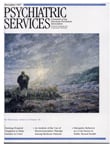The use of alternative medicine has increased in the U.S. in recent years, fueled by a growing acceptance of these treatments as alternatives to traditional therapies (
1,
2). This report assesses the degree to which nonconventional drug therapies are currently supplementing or replacing prescription antidepressants among individuals with major depression.
To examine this issue, we used data from the 1988-1994 National Health and Nutrition Examination Survey (NHANES) conducted by the National Center for Health Statistics. A total of 7,589 participants aged 15 to 39 were administered the depression module of the Diagnostic Inventory Schedule and answered detailed questions about their use of prescription and nonprescription medications in the past month. For the 312 individuals meeting criteria for current major depression, we examined the use of antidepressants and nonprescription dietary supplements other than vitamins and minerals, such as herbal medicines and homeopathic remedies.
Overall, 190 individuals without major depression (2.6 percent) and 14 with major depression (4.5 percent) were taking a nonprescription dietary supplement other than vitamins or minerals. Although major depression was a significant predictor of both antidepressant use (χ
2=111, df=1, p<.001) and nonprescription dietary supplement use (χ
2=4.03, df=1, p<.05), the majority of persons with major depression (89 percent) took neither (see
Figure 1).
The NHANES data set has several limitations for fully assessing the use of alternative medicine in depression. First, we did not have data on nonpharmacological forms of traditional and alternative treatments, such as psychotherapy, chiropractic, and meditation. Thus the results likely underestimate the full range of treatments used by depressed individuals. Second, no information was available on why the survey participants were taking the medications, although the increased use of these medications among people with depression suggests the likelihood of some self-medication for depressive symptoms.
Perhaps most striking is the finding that the vast majority of depressed patients in the sample went untreated with either antidepressants or nonprescription medications. This finding underscores concerns about the undertreatment of depression in the U.S., a problem that likely results from a complex array of patient, provider, and health system factors (
3). The low rate of alternative medication use in this sample suggests that the problem is not simply a function of depressed persons' substituting nonconventional therapies for mainstream medical treatment.


